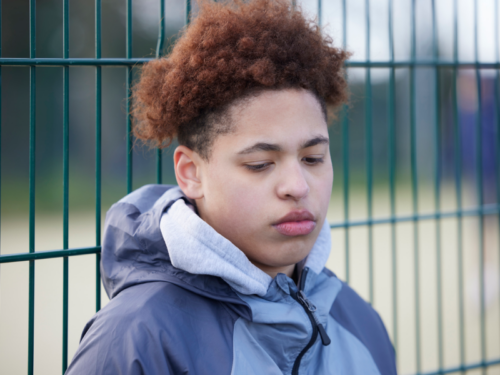Depression Treatment for Teens and Adults
Depression affects millions of people worldwide, but healing is possible with evidence-based treatment. Fill out the short form below or call us directly to start depression treatment with Charlie Health today.
More than 91% of clients see improvements in their most severe mental health symptoms.
How is depression diagnosed?
Diagnosing depression starts with a thorough clinical evaluation of a person’s medical and psychological history, including their family background, substance use, and recent life events. Some of the symptoms of depression outlined in the Diagnostic and Statistical Manual of Mental Disorders (DSM-5) are continuous sadness, a loss of interest in things once enjoyed, appetite and sleep changes, feelings of guilt or worthiness, fatigue, and trouble concentrating. For an official diagnosis, these symptoms should persist for at least two weeks and significantly affect daily life.
How does Charlie Health treat depression?
Depression is often the sum of many different clinical variables, including attachment issues, trauma, and other lived experiences. That’s why we take a personalized approach to curating each client’s unique depression treatment plan and treatment experience.
Each client is paired with an individual therapist who specializes in depression treatment. They’re also matched into an evidence-based group with peers for treatment multiple times per week. These groups are rooted in CBT, motivational interviewing, and psychodynamic treatment, which allows us to directly treat the complexities of depression.
Teens and adults with depression at Charlie Health are set up for long-term healing through comprehensive care.

We proudly partner with many major insurance providers, including commercial, Medicaid, and TRICARE
What are the best therapy options for depression?
Cognitive behavioral therapy (CBT)
CBT treats depression by teaching people to recognize distorted, depressive thinking, such as catastrophizing or all-or-nothing thinking, and replace it with more rational and balanced thoughts. In CBT, people also learn practical coping strategies to manage their depressive symptoms, like setting achievable goals and effective problem-solving.
Motivational interviewing
Motivational interviewing empowers people to find their own reasons for managing depression, which can improve symptoms. By creating a non-judgmental and encouraging atmosphere, a therapist practicing motivational interviewing helps people find ways that work for them to manage depression symptoms, such as additional treatment or lifestyle changes.
Psychodynamic therapy
Psychodynamic therapy helps people with depression understand how early life experiences and underlying, often unconscious, thought patterns may contribute to depressive symptoms. By talking openly and building a strong relationship with their therapists, clients can discover the root causes of their depression. Over time, these insights can help people with depression boost self-esteem and learn healthier coping methods, lessening depressive symptoms overall.
How it works
Reach out
Call our Admissions Team 24/7 or fill out our quick online form to verify your insurance coverage and get started
Get matched
We’ll conduct a thorough assessment to create your personalized virtual treatment plan
Start healing
Meet your peers in groups and your primary therapist in as little as 24 hours
Mental health conditions associated with depression
FAQs about Depression
See All FAQsWhat are the main types of depression?
The DSM-5 includes several types of depression. Here are some of the most common ones:
- Major depressive disorder (MDD): Sometimes referred to as clinical depression, this type of depression involves persistent and severe symptoms such as deep sadness, loss of interest in activities, and changes in sleep and appetite.
- Persistent depressive disorder (PDD): Also known as dysthymia, this type of depression is long-lasting and involves chronic low-grade symptoms, which may not be as severe as those in MDD but can persist for years.
- Bipolar disorder: While not exclusively a depressive disorder, people with bipolar disorder experience mood swings that include depressive episodes similar to those in MDD.
- Seasonal affective disorder (SAD): A type of depression that happens with the changing seasons, typically in the winter months when there is less natural sunlight.
- Premenstrual dysphoric disorder (PMDD): This is a severe form of premenstrual syndrome (PMS) that involves debilitating, often depressive mood symptoms in the premenstrual phase of the menstrual cycle.
What are the symptoms of depression?
Symptoms of depression can include:
- Persistent feelings of sadness, hopelessness, or emptiness
- A loss of interest or pleasure in once-enjoyed activities
- Significant changes in appetite and weight
- Disturbances in sleep patterns (insomnia or excessive sleep)
- A lack of energy or motivation
- Difficulty concentrating, making decisions, or remembering details
- Physical symptoms like aches, pains, and digestive issues
- Feelings of worthlessness, guilt, or thoughts of death or suicide
It’s important to understand that not everyone with depression will have all these symptoms, and their severity and duration can vary widely. If you’re experiencing suicidal thoughts, this is a mental health emergency. Contact The Suicide & Crisis Lifeline 24/7 by calling or texting 988.
Is depression different for teens and adults?
Depression can look different in teens and adults. Younger people might show symptoms of depression like irritability, withdrawal from social activities, problems at school or work, risky behaviors, and difficulty talking about their feelings or asking for help. While these symptoms may also appear in adults with depression, they may be more common in young people. It’s important to notice these signs and connect people with support, like therapy, to prevent possible long-term issues.
How common is depression?
Depression is a common mental health issue that affects millions of people worldwide. The World Health Organization (WHO) estimates that over 264 million people of all ages suffer from depression globally. Depression can happen to anyone at any age, but it’s more commonly diagnosed in some places and more often diagnosed in women than men.
What causes depression?
The causes of depression vary from person to person, but it is believed to be a result of genetic, biological, environmental, and psychological factors. Genetic predisposition, brain chemistry imbalances, chronic stress or trauma, and cognitive styles can all contribute to depression.































